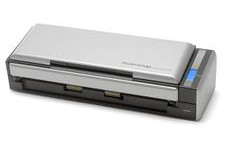Fujitsu ScanSnap 1300i on RHEL/CentOS
Just picked up a shiny new Fujitsu ScanSnap 1300i ADF scanner to get more serious about less paper.

I chose the 1300i on the basis of the nice small form factor, and that SANE reports it having 'good' support with current SANE backends. I'd also been able to find success stories of other linux users getting the similar S1300 working okay:
- http://luuklangens.nl/blog/howto-fujitsu-scansnap-s1300-s300-ubuntu-linux
- http://polyoperable.cmready.com/?p=206
- https://klein2.de/39-fujitsuscansnaps1300ubuntu
Here's my experience getting the S1300i up and running on CentOS 6.
I had the following packages already installed on my CentOS 6 workstation, so I didn't need to install any new software:
- sane-backends
- sane-backends-libs
- sane-frontends
- xsane
- gscan2pdf (from rpmforge)
- gocr (from rpmforge)
- tesseract (from my repo)
I plugged the S1300i in (via the dual USB cables instead of the power
supply - nice!), turned it on (by opening the top cover) and then ran
sudo sane-find-scanner. All good:
found USB scanner (vendor=0x04c5 [FUJITSU], product=0x128d [ScanSnap S1300i]) at libusb:001:013 # Your USB scanner was (probably) detected. It may or may not be supported by # SANE. Try scanimage -L and read the backend's manpage.
Ran sudo scanimage -L - no scanner found.
I downloaded the S1300 firmware Luuk had provided in his post and
installed it into /usr/share/sane/epjitsu, and then updated
/etc/sane.d/epjitsu.conf to reference it:
# Fujitsu S1300i firmware /usr/share/sane/epjitsu/1300_0C26.nal usb 0x04c5 0x128d
Ran sudo scanimage -L - still no scanner found. Hmmm.
Rebooted into windows, downloaded the Fujitsu ScanSnap Manager package and installed it. Grubbed around in C:/Windows and found the following 4 firmware packages:
Copied the firmware onto another box, and rebooted back into linux.
Copied the 4 new firmware files into /usr/share/sane/epjitsu and
updated /etc/sane.d/epjitsu.conf to try the 1300i firmware:
# Fujitsu S1300i firmware /usr/share/sane/epjitsu/1300i_0D12.nal usb 0x04c5 0x128d
Close and re-open the S1300i (i.e. restart, just to be sure), and
retried sudo scanimage -L. And lo, this time the scanner whirrs
briefly and ... victory!
$ sudo scanimage -L device 'epjitsu:libusb:001:014' is a FUJITSU ScanSnap S1300i scanner
I start gscan2pdf to try some scanning goodness. Eeerk: "No devices
found". Hmmm. How about sudo gscan2pdf? Ahah, success - "FUJITSU
ScanSnap S1300i" shows up in the Device dropdown.
I exit, and google how to deal with the permissions problem. Looks like the usb device gets created by udev as root:root 0664, and I need 'rw' permissions for scanning:
$ ls -l /dev/bus/usb/001/014 crw-rw-r--. 1 root root 189, 13 Sep 20 20:50 /dev/bus/usb/001/014
The fix is to add a scanner group and local udev rule to use that
group when creating the device path:
# Add a scanner group (analagous to the existing lp, cdrom, tape, dialout groups)
$ sudo groupadd -r scanner
# Add myself to the scanner group
$ sudo useradd -aG scanner gavin
# Add a udev local rule for the S1300i
$ sudo vim /etc/udev/rules.d/99-local.rules
# Added:
# Fujitsu ScanSnap S1300i
ATTRS{idVendor}=="04c5", ATTRS{idProduct}=="128d", MODE="0664", GROUP="scanner", ENV{libsane_matched}="yes"
Then logout and log back in to pickup the change in groups, and close and re-open the S1300i. If all is well, I'm now in the scanner group and can control the scanner sans sudo:
# Check I'm in the scanner group now $ id uid=900(gavin) gid=100(users) groups=100(users),10(wheel),487(scanner) # Check I can scanimage without sudo $ scanimage -L device 'epjitsu:libusb:001:016' is a FUJITSU ScanSnap S1300i scanner # Confirm the permissions on the udev path (adjusted to match the new libusb path) $ ls -l /dev/bus/usb/001/016 crw-rw-r--. 1 root scanner 189, 15 Sep 20 21:30 /dev/bus/usb/001/016 # Success!
Try gscan2pdf again, and this time it works fine without sudo!
And so far gscan2pdf 1.2.5 seems to work pretty nicely. It handles both
simplex and duplex scans, and both the cleanup phase (using unpaper)
and the OCR phase (with either gocr or tesseract) work without
problems. tesseract seems to perform markedly better than gocr so
far, as seems pretty typical.
So thus far I'm a pretty happy purchaser. On to a paperless searchable future!
blog comments powered by Disqus